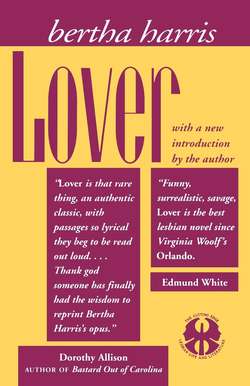Читать книгу Lover - Bertha Harris - Страница 14
На сайте Литреса книга снята с продажи.
Life Before Lover: 5
ОглавлениеMy pre-Lover fiction was still entrenched in the themes of Southern Gothic and Lesbian Gothick; they are not dissimilar, nor are they unlike Italian opera. Both genres tend to be soaked in booze, blood, and tears; both are thick with madness, violence, suicide, and love’s tragic finales. I was perversely laboring to apply, perfected, my version of a literary technique that had died, already perfected, along with the Bloomsbury group, to booze, blood, tears, madness, violence, suicide, love’s tragic finales.
When I asked Parke Bowman (who would publish Lover) why she was so eager to take my novel on, one of the things she told me was that she wanted her company, Daughters, to represent the work of a female avant-garde and that as far as she was concerned, I was it. She went on to say that she was disinterested in feminist and lesbian content or sensibility. Parke freed me from any sense of responsibility to force a direct figuring of the politics, ideals, or goals of feminism or lesbianism or lesbian-feminism in my writing. Nonetheless, my politics (such as they are) exist side by side with my DNA in Lover.
But I’ve never been much of a political animal, nor even a social one: it’s the rules, the ordained procedures and ideologies. I like to be either alone or having a good time. A good time is an interval of passionate and intimate exchange followed almost immediately by seclusion; a night in a great gay bar followed immediately by seclusion; a big, lavish party musiked by wall-to-wall Motown, washed in gin, and dense with new breakups, new couplings, new networking, new gossip, and good dope—and when it’s over, two days later, a month of seclusion.
At one of those parties, circa 1973, the funniest and smartest and straightest woman in New York, Eve Leoff (Keats scholar and Professor of English at Hunter College), told some bozo that she’d rather sit on my lap than dance with him. The bozo threw a sexist, heterosexist, and homophobic tantrum, after which Eve danced with me. Politics are where you find them.
I became, sort of, to the best of my ability, a political animal in the early seventies because, most particularly, I didn’t want to disappoint Kate Millett, whose first book, Sexual Politics, turned me instantly into a radical feminist. But mostly I became a political animal in order to have a good time. Feminism struck me as a good time, and it was. Back then, it still frightened the horses; it made most men foam at the mouth, and it got the best women horny. As such, feminism forcibly yanked my writing up from under the Bloomsbury tomb where it had been trying to pass as good but dead.
Some of the best times I had being political were with the artists, Jenny Snider and Louise Fishman; with Phyllis Birkby, the Yale-trained renegade architect; with Smokey Eule and Mary Korechoff, master carpenters who also kindly hammered some sense into me; with my highly significant attorney, Carol Calhoun; with the anthropologist Esther Newton, whose first book was Mother Camp, a study of heterosexual male transvestism; and with Jane O’Wyatt, mystic and graphics designer. Very often, the most political thing these friends and I did together was to tell one another the truth. Which made us fearless.
